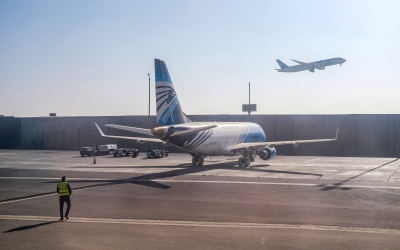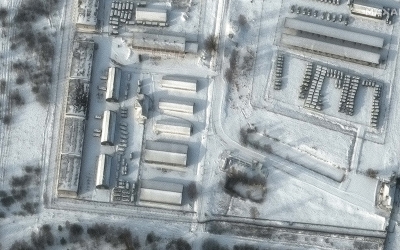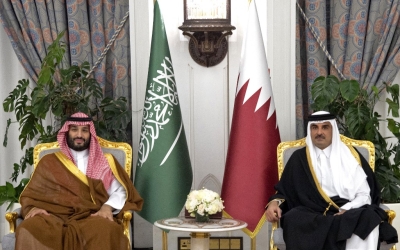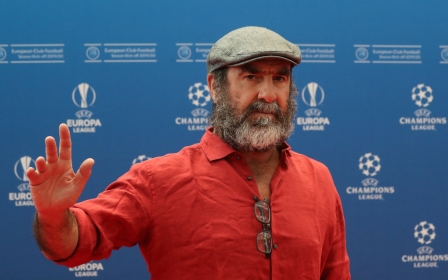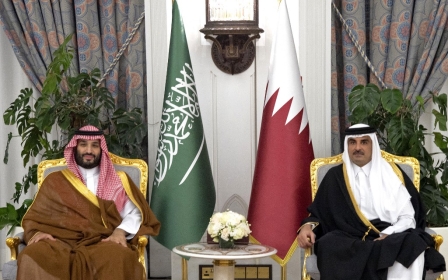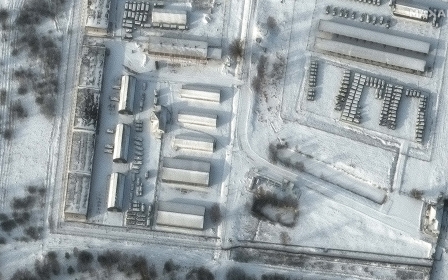Biden to designate Qatar major non-Nato ally, as US seeks help on energy security
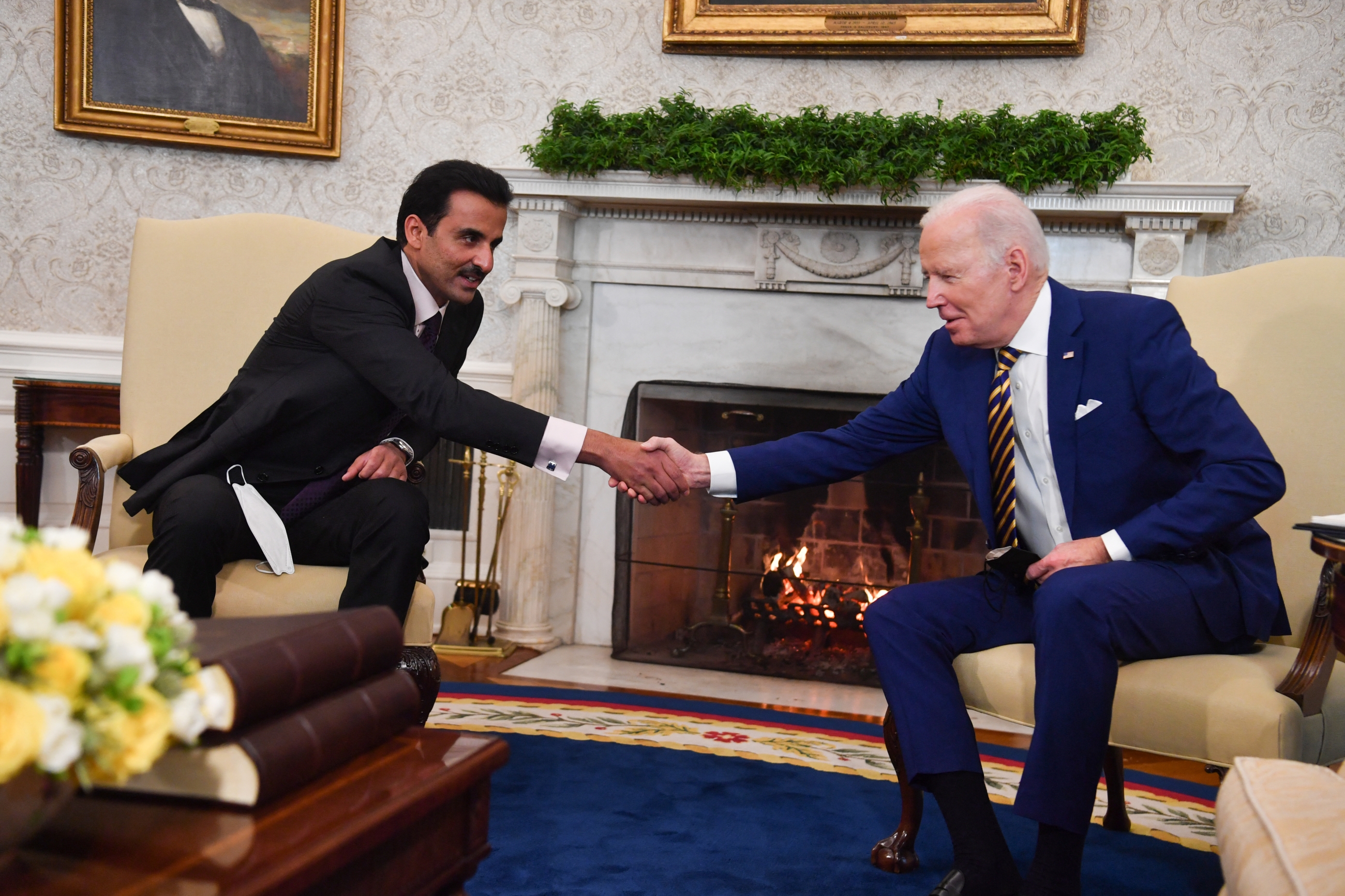
President Joe Biden said on Monday that he plans to designate Qatar a major non-Nato ally, underscoring the critical role the US has come to see the Gulf state playing as Washington looks for help addressing challenges ranging from Afghanistan to a potential shortfall in Europe’s gas supplies, should Russia invade Ukraine.
“The move to designate Qatar as a major non-Nato ally indicates much closer cooperation and recognition of deepening ties between Doha and Washington,” Kristian Coates Ulrichsen, a fellow for the Middle East at Rice University’s Baker Institute for Public Policy, told Middle East Eye
The Emir of Qatar, Sheikh Tamim bin Hamad al-Thani, arrived in Washington on Monday after his country’s profile has risen, following the key role it played in evacuating US citizens, allies and thousands of Afghans during the chaotic US withdrawal from Afghanistan last year. It has since gone on to become the US diplomatic representative in the Taliban-ruled country.
Now the tiny Gulf kingdom of three million, which is one of the world’s top producers of liquefied natural gas (LNG), finds itself positioned to play another role on the global stage.
'The Qataris understand the gas market very well'
- Nikos Tsafos, Centre for Strategic and International Studies
Western officials are concerned that Russia, which typically provides 40 percent of Europe’s natural gas, may constrict supplies in the event it invades Ukraine, delivering a severe blow to European businesses and households at the peak of winter.
New MEE newsletter: Jerusalem Dispatch
Sign up to get the latest insights and analysis on Israel-Palestine, alongside Turkey Unpacked and other MEE newsletters
A senior US administration official said on Sunday that Biden would consult with his Qatari counterpart on “ensuring the stability of global energy supplies”, and that conversations regarding LNG would “figure in the mix” of Monday’s visit.
“Really across the spectrum, the Qataris are looking to showcase that they behave in ways that strengthen US interests," Ulrichsen added.
‘Any molecule matters’
Observers have been keen to note how Tamim's visit to the White House marks a reversal of fortunes for his country, following the end of a nearly 43-month blockade against Qatar by its Arab neighbours.
But Tamim’s arrival also speaks to the challenges the administration has faced. Biden entered office promising to stem the rise of China and enact the Green New Deal. Now in his first meeting with a Gulf leader since taking office, he is confronting the age-old issue of energy security in the Middle East.
“It’s realpolitik,” Karen Dourian, a contributing editor with the Middle East Economic Survey (MEES), told MEE. “The situation has changed to the extent that Biden has even had to call on Opec to produce more oil.”
“It's the reality of life that renewable energy, even as you diversify and accommodate renewable fuels, is not reliable to provide 24-hour electricity”.
'The Qataris are well placed to meet Europe’s demand if they do diversify from Russia'
- Karen Dourian, Middle East Economic Survey
Qatar has warned that its ability to increase supply to Europe is limited by its commitments to long-term contracts, mostly with Asian countries. "We are maxed out,” Saad al-Kaabi, minister of state for energy affairs, said even before the crisis in Ukraine erupted.
Analysts say one advantage is that the country’s gas exports to Asia tend to peak in January, which could make the re-routing of some supplies possible. “At this point, any molecule matters,” Nikos Tsafos, an energy specialist at the Centre for Strategic and International Studies (CSIS), told MEE.
While Europe might catch a reprieve from the additional supply, Tsafos says that in a serious crisis the continent is likely going to need much more than Qatar can offer.
He adds that for Qatar, the second-largest producer of LNG after the US, business calculations will continue to factor into the mix. “The Qataris understand the gas market very well, so I see the diplomatic overtures from the United States as a lubricant rather than a driver.”
The main buyers of Qatar’s LNG are Japan, South Korea and India, all prominent US allies in the region that have locked in gas with long-term contracts.
Robert Mogielnicki, a senior resident scholar at the Arab Gulf States Institute in Washington, said the pressure from global supply constraints means Qatar doesn’t have the ability to “single-handedly alleviate” the energy crunch.
“Any efforts to support worst-case scenario energy needs of European countries would depend on collaboration with Asian partners.”
'Well-placed Qataris'
The focus on energy security comes at a fortuitous time for Qatar, as it pushes ahead with plans to expand its North Field, the world’s largest liquefied natural gas project.
The expansion will cost roughly $30bn and aims to boost the country’s LNG output by 40 percent a year by 2026. “Natural gas demand is going to rise, even with the energy transition,” Dourian said.
“The Qataris are well-placed to meet Europe’s demand if they do diversify from Russia. They have the tanker fleet, production costs are low, and they are making investments to increase capacity”.
It remains to be seen, however, if the crisis in Ukraine will be enough to shift Europe’s dependence on Russia.
The Trump administration had long pushed Germany, the continent’s industrial powerhouse and biggest LNG consumer, to build an import facility that would allow shipments of gas from the US and Qatar. Those plans were delayed and withered with the arrival of the Biden administration.
Environmental concerns prompted the French government to ask power group Engie in October 2020 to hold off on signing a multibillion-dollar deal for US liquefied natural gas over concerns about the deal’s environmental impact.
Asked whether he saw the current crisis with Russia leading to a long-term shift in the European countries’ energy policies, Tsafos from CSIS, was sceptical.
He also questioned whether the Biden administration would look to promote Qatari gas in Europe over the long term. “I am not sure this administration would push for specific measures like asking Europe to sign LNG contracts or build new LNG infrastructure."
Will Qatar get its drones?
While Qatar has drawn criticism for its foreign policy from some in Washington, tensions have cooled recently following the rapprochement between Doha and its Gulf neighbours.
Qatar has also been seen as a potential partner for the US in dealing with Iran, which the US and European powers are locked in negotiations with over a return to the 2015 nuclear deal.
The country’s Foreign Minister Mohammed bin Abdulrahman al-Thani arrived in Washington late last week, following a series of meetings in Tehran with Iranian President Ebrahim Raisi and Foreign Minister Hossein Amir-Abdollahian.
Qatar is also the location of the massive Al Udeid base, home to around 10,000 US troops and the headquarters of the American Combined Air Operations Center.
The announcement by Biden on designating Qatar a major non-Nato ally places the country in the ranks of Bahrain and Kuwait as one of the few Gulf states with the title, giving Qatar preferential access to US military equipment and technology, free surplus material, and prioritised cooperation on training.
The move could help Doha in its efforts to secure the purchase of armed drones from the US. The government of Qatar has been waiting for a response from the US on a request it made more than a year ago to buy four armed MQ-9B Predator drones as part of an estimated $600m deal to boost their defensive capabilities.
The sale has faced some resistance in Washington, with those concerned saying it could upset the balance of power with other regional allies like the UAE and Saudi Arabia.
In a letter sent to Secretary of Defence Lloyd Austin and Secretary of State Antony Blinken last year, Republican Congressmen Jack Bergman and Randy Weber also raised concerns over Qatar’s ties to the Muslim Brotherhood and Hamas as a reason to question the sale.
“We have serious concerns about Qatar’s need for such drones in the light of their terrible human rights records, foreign policy and national security considerations,” the letter stated.
Middle East Eye delivers independent and unrivalled coverage and analysis of the Middle East, North Africa and beyond. To learn more about republishing this content and the associated fees, please fill out this form. More about MEE can be found here.


